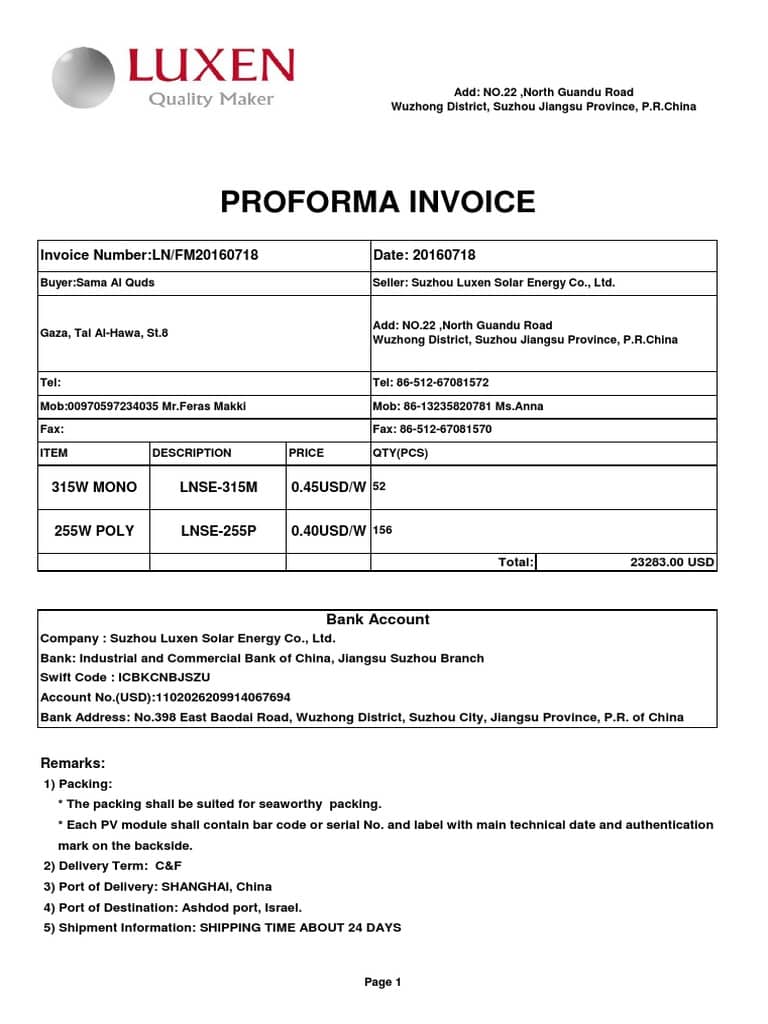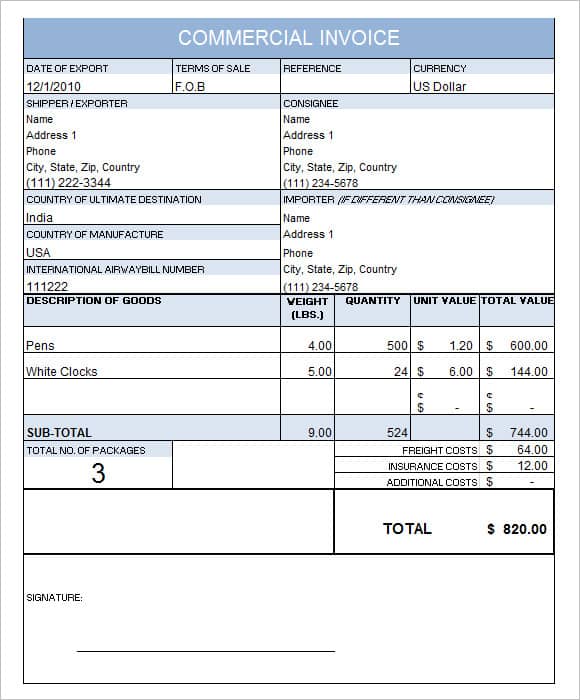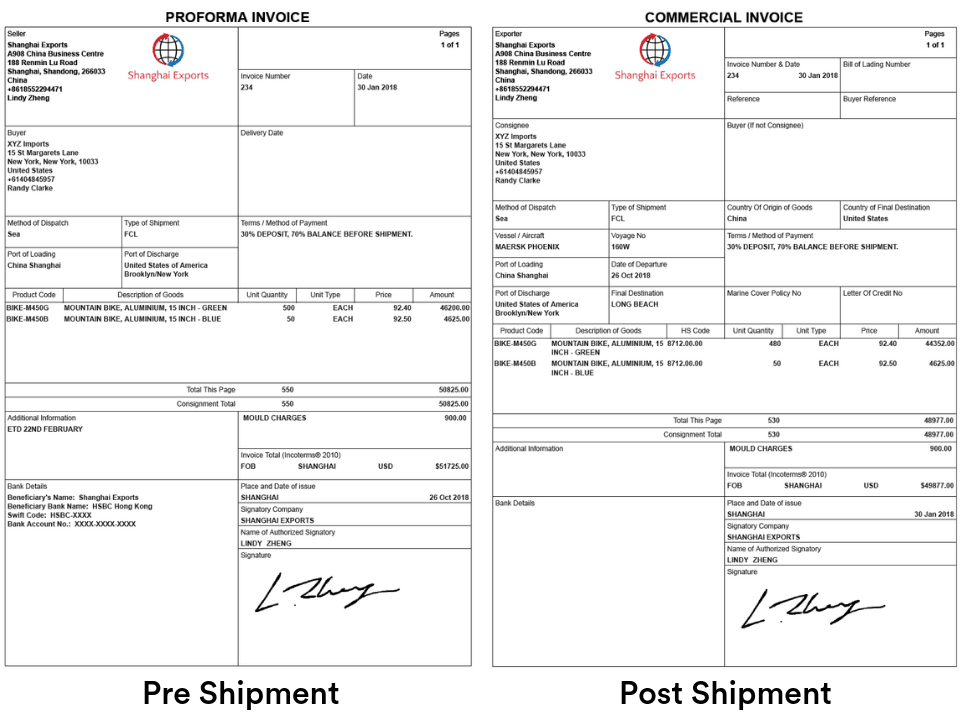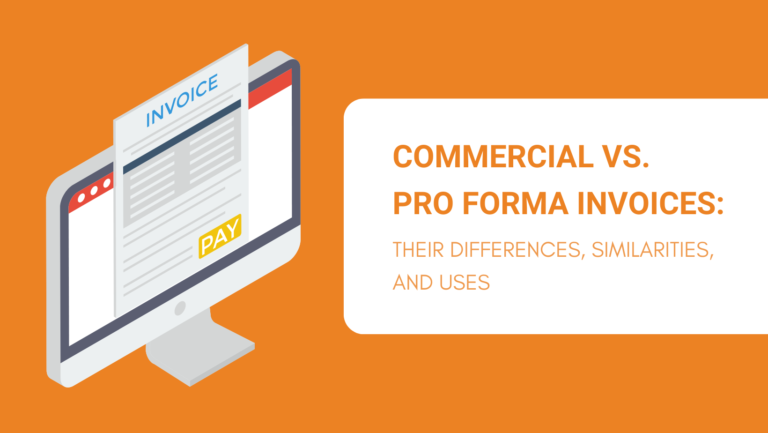Efficient product sourcing is anchored on mutual trust and accountability between buyers and sellers. However, it is also regulated by international laws that outline specific procedures and documents that both parties should follow.
Commercial and pro forma invoices, in particular, play crucial roles in ordering goods, payment processing, and export clearances. Nevertheless, contrary to common assumptions, they are not interchangeable.
So, what is the difference between a commercial vs pro forma invoice? Cozy up and read on as we demystify each of them, discuss how to obtain them, and when to use them.
Let’s jump right into it, shall we?
What Is a Pro Forma Invoice?

A pro forma invoice is a commercial document that a seller issues to a buyer when the buyer expresses interest in buying goods from them.
The pro forma invoice outlines the following details:
- The seller’s company (name & address)
- The buyer’s details (name & address)
- An invoice number
- The date of issue
- Method of shipping
- Type of shipment i.e. FCL or LCL
- The ports of origin and destination
- Terms of payment
- Product details (codes, name, quantities, etc.)
- Shipping charges
- Shipping terms
- The carrier’s details
A pro forma invoice is prepared in the preliminary stages of sourcing i.e. before the seller begins processing an order. Therefore, its details are usually provisional and can change due to various reasons such as:
- You could negotiate for lower prices and thus the prices indicated in the final invoice may vary.
- You could choose to handle shipping independent of the seller or use a different port thereby leading to changes in the shipping details.
- Production delays can sometimes lead to a different delivery date from what is indicated on the proforma invoice.
When Do You Need a Pro Forma Invoice?
A pro forma invoice is crucial during the ordering stage. You will need it to:
Place Your Order

The ordering processing works as follows:
- You request a quote from a supplier
- The supplier responds with a pro forma invoice
- You respond with a purchase order if you find the terms agreeable
The pro forma order is, therefore, essential because it:
- Itemizes specific product details and prices that you can refer to when placing your order.
- Serves as a formal record of the transaction between you and the seller during this preliminary stage.
Make Initial Payment
A pro forma invoice outlines the payment terms and the banking details of a supplier. For example, it may state that you are to pay 30% upfront and 70% before shipping. You will thus use this information to make the first payment as you await the final invoice.
Obtain a Letter of Credit
A pro forma invoice is key when seeking a letter of credit because it proves to your bank that you indeed intend to buy goods from a supplier. It also provides all the pertinent details that the bank needs to draw up the letter of credit such as:
- The seller’s bank details
- The total cost
- When the payment will be due
What Is a Commercial Invoice?

A commercial invoice is a document prepared and issued by a seller to a buyer once their goods are ready for dispatch or have been loaded for shipping.
It contains all the details in a pro forma invoice such as:
- The seller’s company (name & address)
- The buyer’s details (name & address)
- An invoice number
- The date of issue
- Method of shipping
- Type of shipment i.e. FCL or LCL
- The ports of origin and destination
- Terms of payment
- Product details (codes, name, quantities, etc.)
- Shipping charges
- Shipping terms
- The carrier’s details
The only difference is that the details in a commercial invoice are accurate because it is drawn up after the order has been processed and shipping details have all been verified.
When Do You Need a Commercial Invoice?
You will need a commercial invoice for the processes towards the end of your purchase. They include:
The Final Payment

A commercial invoice indicates the exact final payments that you should remit to your supplier to complete your purchase. This includes any costing changes that may have come up after you received the pro forma invoice or after you sent in your purchase order.
Export and Import Clearances
Port officials require and use the commercial invoice attached to a shipment to calculate import or export duties. You may also need it, among other documents, to prove ownership and clear your goods once they arrive at your port.
Handle Shipping Insurance Issues
Insurance providers use a commercial invoice to establish the value of your shipment, evaluate risk, and calculate your premium.
You can also use a commercial invoice to prove the value of your goods if any of them arrive damaged or get misplaced and you need to initiate a claim.
Triggering a Letter of Credit Payment

A letter of credit is a commitment of payment that your bank makes to your supplier. It verifies that you have the financing to pay the supplier’s invoice and that the bank will remit the funds to the supplier after they fulfill your order.
When your seller issues a commercial invoice and a bill of lading, it proves that they have fulfilled your order by shipping the goods to you. You can thus submit the documents to the bank and they will, in turn, pay the supplier.
A Comparison of Commercial vs Pro Forma Invoice Features
Now that we understand what each invoice addresses, individually, let’s weigh them against each other to identify their key differences.

Issuance
Both commercial and pro forma invoices are prepared and issued by a seller to a buyer. However, the timing and the details differ.
Sellers issue a pro forma invoice at the beginning of sourcing. It contains preliminary prices and shipping details often based on a buyer’s inquiry.
In contrast, sellers issue a commercial invoice to finalize a purchase. It includes the actual prices and shipping details involved in the transaction.
Payment
A pro forma invoice is primarily used to outline the prices of the products that you would like to order. It is only used to initiate payment in situations where you may need to pay the first installment to confirm an order.
A commercial invoice, on the other hand, is always used to claim payments. It indicates the full value of the goods but if you had paid an initial installment, the seller might reflect that in the payment details section.
Legal Application

Commercial and pro forma invoices both serve as records of your transaction with a supplier.
However, only commercial invoices are legally recognized when it comes to port clearances or proof of a transaction in most jurisdictions. This is because they provide accurate prices, offering a more factual basis for calculating taxes or estimating value.
Flexibility
A pro forma invoice is negotiable because it only states what a seller can deliver. A commercial invoice, however, is non-negotiable as it is a request for final payment that was already agreed upon.
How to Get a Pro Forma and Commercial Invoice
Pro forma and commercial invoices are standard documents in trade transactions. Your supplier is, therefore, likely to issue each of them at the appropriate time.
However, in some cases, a supplier may choose to issue a quote in a different format instead of a pro forma invoice. If you prefer or require a pro forma invoice to seek a letter of credit, you can request them to draw one up for you.
In other instances, like when sourcing goods through a sourcing agent, you may not be in direct contact with the supplier. It is thus the sourcing agent’s responsibility to obtain a pro forma or commercial invoice on your behalf.
FAQs about Commercial and Proforma Invoices
Is a Pro Forma Invoice the Same as a Quotation?
No.
A typical quotation only outlines the product details, prices, and quantities. It may also include details such as the seller’s and buyer’s company names and addresses.
Notably, it does not contain more extensive details like shipping information or the seller’s banking details like a pro forma invoice. You also can not use a quotation:
- As an instrument to request payment or apply for a line of credit.
- As a record of a transaction.
- To clear goods through customs.
Can You Use a Pro Forma Invoice for Customs Clearances?
It depends on the jurisdiction.
In regions, like the EU, you can use a pro forma invoice when shipping goods that are not for resales such as gifts or donations. Some countries may also allow you to use a pro forma invoice temporarily as long as you provide the commercial invoice later on.
All in all, take the time to understand the law in your country and ensure that you have the right documents.
Who Requires a Commercial Invoice?
Anyone shipping products internationally; regardless of the quantities or whether you are a wholesaler, retailer, or dropshipper. Shipping couriers can not transport your goods and port officials can not clear them without It.
To Sum It Up
Technical terms can make documents like pro forma and commercial invoices seem very complex. However, as illustrated by this blog, they are quite straightforward and make your sourcing and shipping endeavors safer and legitimate.
At NicheSources, we not only source products from well-vetted suppliers but we also ensure that you have the right invoices and all other documents at the right time. Additionally, we can arrange shipping and support you through import and export clearances.
Simply reach out to us with all your sourcing needs, request a free quote, and we will promptly get back to you.

